https://www.austinchronicle.com/music/1998-10-16/520444/
Jazz Sides
October 16, 1998, Music
YESKA
Skafrocubanjazz (Aztlan)
Ska and Afro-Cuban jazz. Yes, ska. It's all in the name. It's also all in the Caribbean-style piano flourish that opens this Los Angeles octet's debut. Kicking off with an instantly recognizable piano progression that surely lights up the dance floors of Miami nightly -- inviting all to samba! -- "Fideo (para aqui)" ("noodle, for here") sets an infectious tone that doesn't let up until the disc-ending reprise, "Fideo (para llevar)" ("noodle, to go"). Congas, bongos, battling timbales, and a three-man horn section (sax, trumpet, trombone) blow out Jamaican ska riffs as the rhythm section skanks to the beat. And just so there's no mistaking to which genre Yeska belongs, alto/tenorman and primary composer David Urquidi follows up the opener with "4th Generation," a driving jam that allows each of the band's soloists to stretch out. The third tune, "Walter's House," with its playful melody, introduces the band's second principal voice, pianist Walter Miranda. Save for the East L.A. block party reworking of Herbie Hancock's "Cantaloupe Island," all titles here are original compositions, "Skaliente" living up to its title, and Urquidi's "The Stakes Are High" playing out like a Seventies heist flick. Similar to Ozomatli, whose former drummer Alfredo Ortiz is now in Yeska (as opposed to Yeska's former saxman Ulysses Bella who's now in Ozomatli), and Chicago's Liquid Soul, this noteworthy gang of young jazzheads' musical hybrid may fall within certain categorical parameters, but it's still a sound without boundaries.
3 Stars -- Raoul Hernandez
LEON PARKER
Awakening (Columbia)
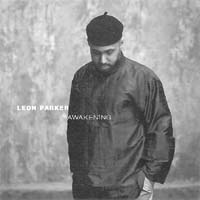 When Leon Parker gigged with Jacky Terrasson, he didn't settle for the usual backseat space occupied by the drummer in a piano trio. Instead, his radically diminished trap set was placed front and center. Yet after reducing the jazz drummer's traditional set-up to a bare minimum and aiming a spotlight at the contraption, Parker dispenses with it altogether on Awakening. In its place are congas, bells, and rattles -- an update of the world music experiments that Don Cherry released 20 years ago. Though Cherry's synthesis baffled much of his free-jazz fanbase, today there's a context for this sort of rhythmic innovation: the rampant Cubanization of the jazz scene wrought by the likes of David Sanchez, Danilo Perez, and the Afro-Cuban All-Stars. Fine as that company is, Parker's album stands apart. Where Sanchez et al fortify hard bop with rhythmic variety, Parker completely jettisons the forward momentum of bop in favor of cyclical movement and careful consideration of space. This is obvious on a track like "Enlightenment," a solo for gong, but it's also evident when saxists Steve Wilson and Sam Newsome pick up their horns. Rather than blow, on most cuts they restrict themselves to quiet obligattoes and long-held notes that bend with the rhythmic changes. It's a beguiling way to put together a jazz album, but it shouldn't surprise anyone. Parker has just found another way to put the drums front and center.
When Leon Parker gigged with Jacky Terrasson, he didn't settle for the usual backseat space occupied by the drummer in a piano trio. Instead, his radically diminished trap set was placed front and center. Yet after reducing the jazz drummer's traditional set-up to a bare minimum and aiming a spotlight at the contraption, Parker dispenses with it altogether on Awakening. In its place are congas, bells, and rattles -- an update of the world music experiments that Don Cherry released 20 years ago. Though Cherry's synthesis baffled much of his free-jazz fanbase, today there's a context for this sort of rhythmic innovation: the rampant Cubanization of the jazz scene wrought by the likes of David Sanchez, Danilo Perez, and the Afro-Cuban All-Stars. Fine as that company is, Parker's album stands apart. Where Sanchez et al fortify hard bop with rhythmic variety, Parker completely jettisons the forward momentum of bop in favor of cyclical movement and careful consideration of space. This is obvious on a track like "Enlightenment," a solo for gong, but it's also evident when saxists Steve Wilson and Sam Newsome pick up their horns. Rather than blow, on most cuts they restrict themselves to quiet obligattoes and long-held notes that bend with the rhythmic changes. It's a beguiling way to put together a jazz album, but it shouldn't surprise anyone. Parker has just found another way to put the drums front and center.
4.5 Stars -- Jeff Salamon
DAVE HOLLAND QUINTET
Points of View (ECM)
Opposed to the more common jazz quartet, a quintet's extra musician brings forth more moods, textures, and possibilities. Joining bassist Holland to form the namesake quintet are Robin Eubanks on trombone, Steve Wilson on soprano and alto saxes, Billy Kilson on drums, and Steve Nelson on vibraphone and marimba. The results: "Metamorphos," smokin' source material for Charlie Hunter-philes, neo-hard boppers, and NYC's downtown mise-en-scene mavens; and "Bedouin Trail," which evokes the same sonicscape as Duke Ellington's "Caravan." This eight-minute tune starts out simple enough, but when Nelson's delirious vibraphone solo splashes over Holland's camel-stride bass, you're right behind them on the next beast of burden. Also, the quick-start swing and sway of "Mr. B" (a tune dedicated to acoustic bassist Ray Brown, the swing set behind Ella, Basie, and Bird), or "Serenade," where Nelson's marimba-ing sends you to steel drum heaven, show that Holland is as vital today as he was in the late Sixties when Miles Davis asked him to play on In a Silent Way. Holland has also laid the bassline down under Charles Lloyd, Thelonious Monk, Coleman Hawkins, and the late great Betty Carter. As a bandleader and primary composer, Holland continues keepin' it real.
3.5 Stars -- David Lynch
HENRY KAISER/WADADA LEO SMITH
Yo Miles (Shanachie)
VARIOUS ARTISTS
Endless Miles (N2K Encoded Music)
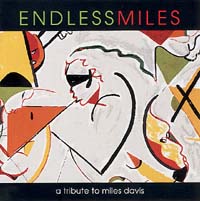 Both of these recordings are Miles Davis tributes, but the approach taken by their producers varies radically. Endless Miles, a live recording, features musicians who played with Davis or were otherwise associated with him performing tunes from his repertoire. The cast includes trumpeters Randy Brecker and Wallace Roney, tenor saxmen George Coleman, Dave Liebman, Antoine Roney, and Bob Berg, pianists Harold Mabern and Geri Allen, bassists Gary Peacock and Buster Williams, and drummers Jimmy Cobb, Al Foster, and Lenny Williams. They're grouped in combos ranging from a duo to an octet, and their number includes both skillful imitators (Wallace Roney) and innovators (Peacock). They generally play with inspiration, but they're a long way from breaking new ground. The 2-CD Yo Miles has the advantage of focusing on material from Davis' 1970-75 electric band period, which hasn't been explored as much. There's good reason for this, as annotator Enrico Merlin points out in the album's liner notes: "Perhaps because of its intangibility, few musical homages have been made to this music over the years. After all, we don't have songs with clear chord progressions to improvise over; instead we have music based on only a few elements, music which provides little guidance." The basic personnel on Yo Miles is trumpeter Smith, guitarists Kaiser, Nels Cline, and Chris Muir, bassist Michael Manring, and percussionist/drummers Wally Ingram and Lukas Ligeti. Guests include organist John Medeski, keyboardist Paul Plimley, and guitarist Elliott Sharp, along with several saxophonists and bass clarinetist Oluyemi Thomas. They don't play with the daring and intensity of Davis and his sidemen, but their performances are thoughtful, well-paced, and stimulating. There are fewer long solos than on Davis' albums, more emphasis being on collective improvisation, but the Kaiser/Smith group displays its own personality, which differentiates it from many other Davis tribute outfits.
Both of these recordings are Miles Davis tributes, but the approach taken by their producers varies radically. Endless Miles, a live recording, features musicians who played with Davis or were otherwise associated with him performing tunes from his repertoire. The cast includes trumpeters Randy Brecker and Wallace Roney, tenor saxmen George Coleman, Dave Liebman, Antoine Roney, and Bob Berg, pianists Harold Mabern and Geri Allen, bassists Gary Peacock and Buster Williams, and drummers Jimmy Cobb, Al Foster, and Lenny Williams. They're grouped in combos ranging from a duo to an octet, and their number includes both skillful imitators (Wallace Roney) and innovators (Peacock). They generally play with inspiration, but they're a long way from breaking new ground. The 2-CD Yo Miles has the advantage of focusing on material from Davis' 1970-75 electric band period, which hasn't been explored as much. There's good reason for this, as annotator Enrico Merlin points out in the album's liner notes: "Perhaps because of its intangibility, few musical homages have been made to this music over the years. After all, we don't have songs with clear chord progressions to improvise over; instead we have music based on only a few elements, music which provides little guidance." The basic personnel on Yo Miles is trumpeter Smith, guitarists Kaiser, Nels Cline, and Chris Muir, bassist Michael Manring, and percussionist/drummers Wally Ingram and Lukas Ligeti. Guests include organist John Medeski, keyboardist Paul Plimley, and guitarist Elliott Sharp, along with several saxophonists and bass clarinetist Oluyemi Thomas. They don't play with the daring and intensity of Davis and his sidemen, but their performances are thoughtful, well-paced, and stimulating. There are fewer long solos than on Davis' albums, more emphasis being on collective improvisation, but the Kaiser/Smith group displays its own personality, which differentiates it from many other Davis tribute outfits.
(Yo Miles) 3.5 Stars
(Endless Miles) 3 Stars -- Harvey Pekar
DAVE DOUGLAS
Charms of the Night Sky (Winter & Winter)
DAVE DOUGLAS
Magic Triangle (Arabesque)
One reason trumpeter Dave Douglas has risen so far so fast is his strictly individual approach, a particular style that refuses to emulate past masters. His short clipped phrases, blues inflections, and warm fluid tone might briefly recall everyone from Clifford Brown to Lester Bowie, but such references are fleeting. Ask Douglas his influences and he'll likely name someone like Stevie Wonder. Despite this postmodern stance having drawn the ire of some of the New York jazz establishment, and his eponymous debut not having been released until 1993, Douglas is already widely regarded as one of the very best at his instrument. Two recent recordings do nothing to dispel the notion. Charms of the Night Sky is a near hybrid of Douglas' String Band and his work with John Zorn's Klezmer ensemble, Masada. Joined by accordion, bass, and violin (Mark Feldman, from the String Band), the album of Eastern-themed originals, some of which date back to his New York busking days, might not pack all the melodrama of a Masada date, but the results are entrancing nonetheless. Magic Triangle is a confident and straight-ahead jazz quartet date, with journeyman Chris Potter's tenor as Douglas' sparring partner on some post-bop bouts. The trumpet, in the right hands, remains the most expressive of all jazz instruments, and Douglas imbues his voice with sonorous character, plumbing emotive depths rarely reached; listen to Triangle's "Kisangani" or Charm's "Bal Masque." A slight nod goes to the romanticism of Charms, but in truth, there's not a bad note to be heard on either of these recordings.
(Both) 4 Stars --Jeff McCord
PATRICIA BARBER
Modern Cool (Premonition)
VARIOUS ARTISTS
Jazz A Saint Germain (Higher Octave)
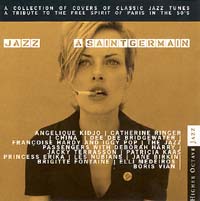 It would be easy to classify Patricia Barber as simply another trendy torch singer and leave it at that. While her vocal delivery can certainly be on the torchy side, this Chicago-based singer/songwriter/jazz pianist has instead served up a collection of modern, edgy, mostly original tunes just oozing with attitude, irony, self-confidence, and virtually bereft of the sappy sentimentality usually associated with the genre. Barber's first nationally released album, Distortion of Love (Antilles) was a primarily instrumental jazz affair, striking for its dazzling pianistics and hard-edged ensemble sound. Here, unfortunately, she's all but forsaken her deftness on the ivories, parlaying a sharp sense of angst and irony, which characterized her instrumental prowess, into her songs and vocal style. She is most successful on moody, fin-de-siècle odes like "Postmodern Blues" and "Company" and on the deliciously tacky "Touch of Trash." Barber's attempt at cover tunes aren't as strong, with "Light My Fire," an understated contrast to the Doors' convulsive original, and Paul Anka's "She's a Lady" both coming up short-handed. The standard, "You & the Night & the Music," however, is an ideal vehicle for Barber and her band, resulting in one of the set's high points. The ubiquitous and highly regarded trumpeter, Dave Douglas, is superb throughout, as are the atmospherics provided by guitarist John McLean. Unlike the cathartically angry young women now roaming the rock landscape, Patricia Barber brings a decidedly more mature and tempered, if no less combustible, perspective to the fore. Best of all, it makes for some great night music. Speaking of things moody and nocturnal, a quite complementary companion to Barber's Modern Cool is the delightful compilation, Jazz A Saint Germain, which pays tribute to the libertine spirit of post-war Paris when the freewheeling sounds of jazz and an air of existentialism filled the subterranean clubs of the city's St. Germain district. I'm usually skeptical about these kinds of collections, but the songs, and more importantly, the performances, taken as a whole, are certainly evocative of an exotic dreamscape. There are intriguing vocal combinations (French chanteuse Françoise Hardy and Iggy Pop!), unusual re-interpretations of standards (a hip-hop/reggae reading of "God Bless the Child"), and even a smidgen of old-fashioned sentimentality (Jane Burkin and jazz piano legend Jimmy Rowles on a heartfelt version of "These Foolish Things"). Other artists included are jazz diva Dee Dee Bridgewater, West African superstar Angelique Kidjo, and NYC downtownsters the Jazz Passengers with Deborah Harry. This one's gotten a lot of airplay around my house of late and it just might be the next best thing to a nightcap in a smoky Left Bank dive.
It would be easy to classify Patricia Barber as simply another trendy torch singer and leave it at that. While her vocal delivery can certainly be on the torchy side, this Chicago-based singer/songwriter/jazz pianist has instead served up a collection of modern, edgy, mostly original tunes just oozing with attitude, irony, self-confidence, and virtually bereft of the sappy sentimentality usually associated with the genre. Barber's first nationally released album, Distortion of Love (Antilles) was a primarily instrumental jazz affair, striking for its dazzling pianistics and hard-edged ensemble sound. Here, unfortunately, she's all but forsaken her deftness on the ivories, parlaying a sharp sense of angst and irony, which characterized her instrumental prowess, into her songs and vocal style. She is most successful on moody, fin-de-siècle odes like "Postmodern Blues" and "Company" and on the deliciously tacky "Touch of Trash." Barber's attempt at cover tunes aren't as strong, with "Light My Fire," an understated contrast to the Doors' convulsive original, and Paul Anka's "She's a Lady" both coming up short-handed. The standard, "You & the Night & the Music," however, is an ideal vehicle for Barber and her band, resulting in one of the set's high points. The ubiquitous and highly regarded trumpeter, Dave Douglas, is superb throughout, as are the atmospherics provided by guitarist John McLean. Unlike the cathartically angry young women now roaming the rock landscape, Patricia Barber brings a decidedly more mature and tempered, if no less combustible, perspective to the fore. Best of all, it makes for some great night music. Speaking of things moody and nocturnal, a quite complementary companion to Barber's Modern Cool is the delightful compilation, Jazz A Saint Germain, which pays tribute to the libertine spirit of post-war Paris when the freewheeling sounds of jazz and an air of existentialism filled the subterranean clubs of the city's St. Germain district. I'm usually skeptical about these kinds of collections, but the songs, and more importantly, the performances, taken as a whole, are certainly evocative of an exotic dreamscape. There are intriguing vocal combinations (French chanteuse Françoise Hardy and Iggy Pop!), unusual re-interpretations of standards (a hip-hop/reggae reading of "God Bless the Child"), and even a smidgen of old-fashioned sentimentality (Jane Burkin and jazz piano legend Jimmy Rowles on a heartfelt version of "These Foolish Things"). Other artists included are jazz diva Dee Dee Bridgewater, West African superstar Angelique Kidjo, and NYC downtownsters the Jazz Passengers with Deborah Harry. This one's gotten a lot of airplay around my house of late and it just might be the next best thing to a nightcap in a smoky Left Bank dive.
(Modern Cool) 4 Stars
(Jazz A St. Germain) 3.5 Stars -- Jay Trachtenberg
MEDESKI, MARTIN & WOOD
Combustication (Blue Note)
Each member of MMW, keyboardist John Medeski, percussionist Billy Martin, and bassist Chris Wood, has formal musical training, but you wouldn't know it by glancing at their busy tour schedule. The band has eschewed the pretentious world of smelly perfume and corporate welfare for the smoky, delicious dank of jazz and rock clubs. And thank Zeus, too, because the jazz world needed a kick in the ass. MMW's intrepid funky-rock improvisations and capricious jazz stage presence are welcome relief from the same old neo-this and fusion-that. Their last big outing (if you don't count Farmer's Reserve, their self-distributed hour-long jam session), Shackman, was more of a sketchpad for their renowned peak-and-valley, circus-like performances than a selection of tight compositions contextualized in the studio. Somehow, Combustication's 12 tracks are both: the famous flights of fancy and deep improbability are present, but expanding their creative palette, MMW adds both scratchmeister DJ Logic, who starts the listener's head a-spinnin' on the opener "Sugar Craft," and Steve Canon's spoken word on "Whatever Happened to Gus." Yet MMW isn't just copying the flava-of-tha-month schtick or following trends; they're playing with these ideas, developing and expanding them. Improving them. In their inaugural release on Blue Note, MMW proves that they are worth their weight in hype. If not more.
3.5 Stars -- David Lynch
DAVID S. WARE
Go See the World (Columbia)
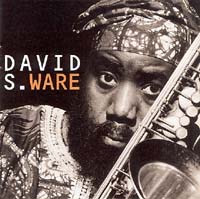 It's tempting for the uninitiated to write off David S. Ware's aural fury as nothing more than sheer cacophony. The relentless nature of his playing only makes musical sense in the big picture, which is neither easily absorbed with limited listening, or filtered through a mind blocked with preconceived notions. The tenor saxophonist and his steadfast associates (Matthew Shipp, piano; William Parker, bass; and newer member, drummer Susie Ibarra) make music where form constantly triumphs over individuality; it's a rich if not instantly obvious musical journey. Ware wails and sputters while Shipp plays with quiet eloquence, or the reverse; when they're in sync, then Ibarra attacks without warning. Underneath it all, Parker is the glue that holds the puzzle together. None of this edge has been tempered for Ware's major label debut, Go See the World. The quartet takes their cue from John Coltrane's "sheets of sound" approach, yet driven by Ware's salty tone and Shipp's undulating cascades, these sheets hit more like waves pounding a seawall. Longevity has made this a powerful ensemble, and if Ware's compositional talents are not quite up to the bar set by the band's performances, well, not much is. The album's only standard, "The Way We Were" (yes, the Marvin Hamlisch kitsch classic) has moments where the band collectively skids and crashes, only to pick themselves up and carry on. It's a jarring device, yet it pulls you inside the song, and turns its structure inside out. Produced by Ware and Steven Joerg (whose own AUM Fidelity label has recorded Ware), this is an album of remarkable beauty that could only be achieved with an intensity very few players manage to deliver. Few, in fact, are brave enough to even try.
It's tempting for the uninitiated to write off David S. Ware's aural fury as nothing more than sheer cacophony. The relentless nature of his playing only makes musical sense in the big picture, which is neither easily absorbed with limited listening, or filtered through a mind blocked with preconceived notions. The tenor saxophonist and his steadfast associates (Matthew Shipp, piano; William Parker, bass; and newer member, drummer Susie Ibarra) make music where form constantly triumphs over individuality; it's a rich if not instantly obvious musical journey. Ware wails and sputters while Shipp plays with quiet eloquence, or the reverse; when they're in sync, then Ibarra attacks without warning. Underneath it all, Parker is the glue that holds the puzzle together. None of this edge has been tempered for Ware's major label debut, Go See the World. The quartet takes their cue from John Coltrane's "sheets of sound" approach, yet driven by Ware's salty tone and Shipp's undulating cascades, these sheets hit more like waves pounding a seawall. Longevity has made this a powerful ensemble, and if Ware's compositional talents are not quite up to the bar set by the band's performances, well, not much is. The album's only standard, "The Way We Were" (yes, the Marvin Hamlisch kitsch classic) has moments where the band collectively skids and crashes, only to pick themselves up and carry on. It's a jarring device, yet it pulls you inside the song, and turns its structure inside out. Produced by Ware and Steven Joerg (whose own AUM Fidelity label has recorded Ware), this is an album of remarkable beauty that could only be achieved with an intensity very few players manage to deliver. Few, in fact, are brave enough to even try.
3.5 Stars -- Jeff McCord
FRED HERSCH + BILL FRISELL
Songs We Know (Nonesuch)
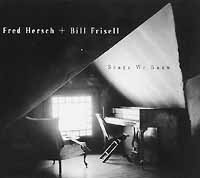 Fred Hersch and Bill Frisell have been playing together on and off since 1980. While their mutual respect is obvious, so is the fact that their approaches differ. Hersch personifies competence; he's an excellent technician, knowledgeable and versatile, having recorded albums devoted to the work of great jazz composers including Billy Strayhorn and Thelonious Monk. Frisell is more identified with the avant garde; he's one of the most original guitarists to emerge in the past 25 years. His improvisation is economical and earthy, although he too has the ability and knowledge to play in settings ranging from country to classically influenced. On Songs We Know, the duo offers a program of frequently heard standards, but their approach to them is hardly conventional. Everything, including pieces usually performed with abandon like "I Got Rhythm," is performed deliberately and thoughtfully. Neither man is into running changes; they often emphasize improvising on melodies rather than on their chord structures. Both are into timbral variation and clothe their material with fresh colors and textures. By bending notes and choosing odd intervals Frisell casts themes in a different light. Unfortunately, the interplay is a bit ragged; nevertheless this is a provocative disc worth having.
Fred Hersch and Bill Frisell have been playing together on and off since 1980. While their mutual respect is obvious, so is the fact that their approaches differ. Hersch personifies competence; he's an excellent technician, knowledgeable and versatile, having recorded albums devoted to the work of great jazz composers including Billy Strayhorn and Thelonious Monk. Frisell is more identified with the avant garde; he's one of the most original guitarists to emerge in the past 25 years. His improvisation is economical and earthy, although he too has the ability and knowledge to play in settings ranging from country to classically influenced. On Songs We Know, the duo offers a program of frequently heard standards, but their approach to them is hardly conventional. Everything, including pieces usually performed with abandon like "I Got Rhythm," is performed deliberately and thoughtfully. Neither man is into running changes; they often emphasize improvising on melodies rather than on their chord structures. Both are into timbral variation and clothe their material with fresh colors and textures. By bending notes and choosing odd intervals Frisell casts themes in a different light. Unfortunately, the interplay is a bit ragged; nevertheless this is a provocative disc worth having.
3.5 Stars -- Harvey Pekar
WESSELL "WARMDADDY" ANDERSON
Live at the Village Vanguard (Leaning House)
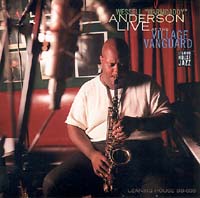
New Orleans alto sax player Wessell Anderson has cast his lot among Coltrane, Rollins, and Gillespie (on Dallas indie Leaning House Jazz), by releasing nine songs recorded at the legendary Village Vanguard in New York. All over this album, Anderson shows that his playing in the prestigious Lincoln Center Jazz Orchestra under the direction of Wynton Marsalis (as well as in Marsalis' Septet) was time well-spent, as he blows his horn with a passionate mix of scholarly precision and Southern soul. The recording starts out playfully, a bouncing piano intro to Anderson's composition "African Cowboy," but it doesn't take Warmdaddy long before his alto shreds the proceedings into a neo-bop breakdown that suggests the cool flights of Cannonball Adderly while maintaining the grin-filled personality that permeates his own original compositions (three of which are on this album). Anderson's mastery of the alto saxophone enables him not only to create wonderfully constructed melodic improvisations in each tune, but also to blow open any melody he lays down with blaring and sustained repetition of a note or a phrase, as when he squeezes the life out of a three-note drop over and over to the breaking point until it slides easily back into the melancholy stroll of "Soul Eyes." Having been dropped by Atlantic after two solid recordings, Anderson's move to the upstart Leaning House may be just the right pairing both of them need to take their names to the next level.
4 Stars -- Christopher Hess
RANDY WESTON
Khepera (Verve)
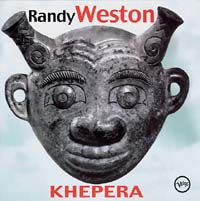
Over a period of several decades, septuagenarian pianist Randy Weston has earned himself a highly respected and artistically profound niche within the jazz hierarchy. Since the early Sixties when his ambitious Uhuru Afrika celebrated the independence of numerous African nations from Europe's centuries-old imperialist rule, through his many years of living in Morocco and ceaseless traveling throughout the continent, Weston has developed a keen Afrocentric sensibility that brightly colors his well-grounded roots as a Monkish, post-bop pianist. His compositions "Hi-Fly" and "Little Niles" have long been standards in the jazz repertoire. Khepera is in keeping with most of Weston's half-dozen previous Verve releases this decade in its adherence to a decidedly non-Western frame of reference that evokes a timeless quality -- as if it were a cherished gift handed down from antiquity. This music is about moods that unfold and vamps upon which the spirits arise. Weston is a master of deceptive understatement with an uncanny ability of finding the music's emotional core. He doesn't so much awe you with power and prowess as he does effortlessly seduce you with subtlety and grace. His musical visions are given life through African Rhythms, a three-tiered ensemble consisting of piano trio, African and Asian percussionists, and the now familiar frontline of Weston veterans Talib Kibwe on alto sax and flute, Benny Powell on trombone, and the legendary Pharoah Sanders on tenor sax. The revered Melba Liston, whose masterful and sublime arrangements have provided a distinctive clarity to Weston's music for 40 years, is again on board lending her expertise for melding the voices of multiple horns into an extension of Weston's piano. Khepera is the ancient Egyptian word for "transformation." Perhaps Weston was envisioning a spiritual-to-musical transformation; if so, his true believers won't be hard to find. (Randy Weston plays UT's Hogg Auditorium, Saturday, October 17.)
4 Stars -- Jay Trachtenberg
Copyright © 2024 Austin Chronicle Corporation. All rights reserved.
